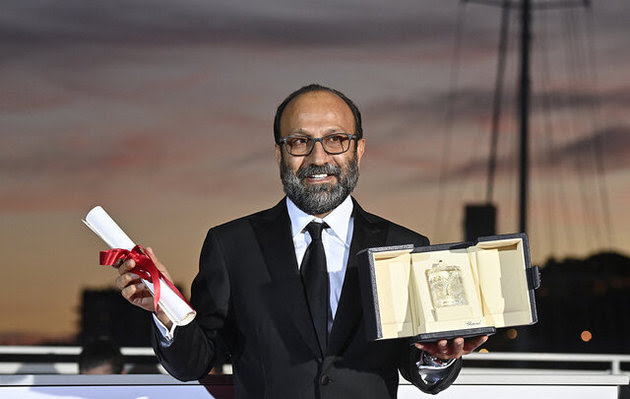A Review of Iranian Films Acclaimed at Cannes Festival

Asghar Farhadi’s new film “A Hero†which won the Grand Prize of the 74th Cannes International Film Festival was not the first Iranian film to be praised at the prestigious festival.
Of course after Abbas Kiarostami’s “The Taste of Cherry†which won Palme de’Or in 1997, the Grand Prize awarded to “A Hero†is the most important title added to the showcase of Iranian cinema honours.
By winning the grand prize of the jury of this year’s Cannes Film Festival, the total number of awards given to Iranian films at this event reached 40.
According to ISNA, Asghar Farhadi started showing his works in Cannes with the film “The Past†in 2013, and so far he has unveiled all his works at the Cannes Film Festival to turn into a kind of popular face of Cannes.
Here is an overview of the awards received by Iranian films at the Cannes during the past six decades.
The first award won by an Iranian film in the Cannes was in 1964 with the film “Dawn of the Capricorn†by the late Ahmad Farooqi Qajar in the short film competition section. It could also win the “High Technical Council Awardâ€.
28 years later, the film “Life and Nothing Else†by Abbas Kiarostami was screened and won the “Best Film†award as well as the “Rossellini Awardâ€.
In 1995, Jafar Panahi received three awards, “Golden Cameraâ€, “Fipresci Prize†and “Best Film in the Fifteen Days of Directing†category, for his “White Balloonâ€.
Two years later, in 1997, the film “The Taste of Cherry†by Abbas Kiarostami received the Palme d’Or of the festival jointly with the “The Eel†made by Shohi Imamura from Japan.
Samira Makhmalbaf won the “Jury Prize†in 2000 with her film “Blackboard†and in the same year, Hassan Yektapnah won the “Camera d’Or Award†for his “Djomeh†jointly with Bahman Ghobadi’s “A Time for Drunken Horses.†The latter also received two “Art and Experience†awards in this section and a “Fipresci†award.
Mohsen Makhmalbaf received a side award in 2001 for his film “Kandaharâ€.
Reza Mirkarimi also won the Best Feature Award at the 40th Critics’ Week at the 2001 Cannes International Film Festival for his feature, “Under the Moonlightâ€.
In 2003, Samira Makhmalbaf’s “Five in the Afternoon†was premiered in the competition section of the Festival and was awarded the Jury Prize and the Prize of the Ecumenical Jury and Jafar Panahi won the Un Certain Regard Jury for his “Crimson Redâ€.
Mohsen Amir Yousefi took home the Camera d’Or in the 2004 Cannes Film Festival as well as generous critical acclaim for his feature “Bitter Dreamâ€.
In 2007, the film “Persepolisâ€, co-produced by MarjaneSatrapi and Vinsents Parono, was screened as a product of the United States and France in the competition section of the Cannes Film Festival and received the Jury’s Prize.
Bahman Ghobadi in 2009 with the movie “Nobody knows about Iranian cats!†won the Special Jury Prize award at the Cannes Film Festival.
Abbas Kiarostami participated in the Cannes competition with the French / Italian film “Certified Copy†in 2010 where Juliette Binoche won the Best Actress Award for her performance.
In 2011, Jafar Panahi won the Carrosse d’Or at this year’s Cannes film festival, and Mohammad Rasoulof’sGoodbye (Be omid-e didar) premiered at the 2011 Cannes Film Festival in the section Un Certain Regard and won the prize for directing.
In 2013, 4 awards were given to the films “The Past†by Asghar Farhadi, “Manuscripts Do Not Burn†by Mohammad Rasoulof, and “Needle†by Anahita Qazvinizadeh.
In 2015, the first feature film made by Ida Panahandehcalled “Nahid†screened in the Un Certain Regard section at the Cannes Film Festival where it won a Promising Future Prize (special jury prize for debut films).
In 2016, the film “The Salesman†by Asghar Farhadipremiered in competition in the 2016 Cannes Film Festival, where it won two awardsâ€"Best Screenplay for Farhadi and Best Actor for Hosseini.
Ali Ahmadi won the second prize in the cinefondationsection with the British film “In the Hills†and Ida Panahandeh also received the Women In Motion Young Talent Award.
In 2018, Jafar Panahi’s “3 Faces†premiered in Cannes and won the Best Screenplay award and Iranian filmmaker Ali Abbasi won the Best Screenplay Award for his film “Borderâ€. (feminine)
Out of 40 awards received by Iranian cinematographers, 39 awards have been given to artists in the years after the revolution and one award won before the revolution.
Six films produced by foreign countries and directed Iranian directors have won awards at the Cannes Film Festival.
The official section of Cannes Film Festival, including the feature and short film competition has awarded 24 prizes to Iranian cinematographers so far, including 10 features, one short film award, two cinefondationsection prizes, 7 special prizes and 3 Golden Cameras.
Subscribe
0 Response to "A Review of Iranian Films Acclaimed at Cannes Festival"
Post a Comment